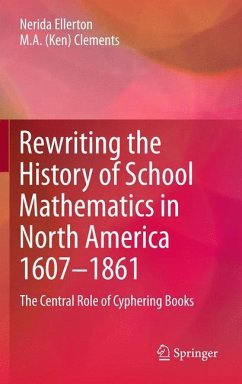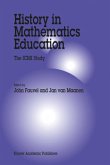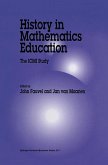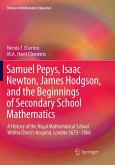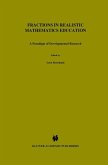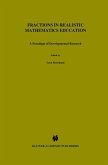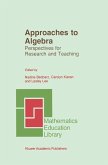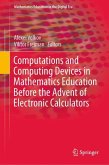Two centuries ago, American teachers did not stand at the front of the room and teach, and most students even those studying mathematics did not own a mathematics textbook. Written examinations of any kind were not used. Most teachers of mathematics did not have formal qualifications in mathematics. The modern educator might well ask: If all of that is true, then how were teachers expected to teach and how were students expected to learn mathematics?
In this book Nerida Ellerton and Ken Clements argue that before 1840 mathematics was taught in North America via a cyphering approach that had been translated from Western Europe to the new settlements. This approach was based on a tradition that had endured since the thirteenth century, and depended heavily on students carefully writing their mathematics in cyphering books. After 1840, schools gradually adopted more teacher-centered whole-class pedagogies for mathematics instruction, and by the beginning of the Civil War, in 1861, the transformation was complete.
In his Foreword to this book, Jeremy Kilpatrick states:
Ellerton and Clements show that the cyphering approach to learning mathematics has both an extensive history and a complex rationale. In the approach, the learner was to become an independent problem solver by learning to identify problems of various types, learning the rules for their solution, solving such problems, having each solution checked by a tutor or teacher and, only when the solution was correct, copying that solution into a cyphering book using exemplary calligraphy. The handwriting process was not meant to be only copying; it was to be an accompaniment to thinking. The learner was not simply inscribing the solution on to paper; he or she was inscribing it into memory. Cyphering books are a much neglected resource for understanding and appreciating the early history of North American mathematics education. The present book marks a major advance in putting that resource to effective use as well as in raising some challenging questions for subsequent research.
This book provides the first history of early North American school mathematics in which the implemented curriculum as seen in cyphering books takes center stage, while the intended curriculum as evident in textbooks provides contextual background for the main argument.
Hinweis: Dieser Artikel kann nur an eine deutsche Lieferadresse ausgeliefert werden.
In this book Nerida Ellerton and Ken Clements argue that before 1840 mathematics was taught in North America via a cyphering approach that had been translated from Western Europe to the new settlements. This approach was based on a tradition that had endured since the thirteenth century, and depended heavily on students carefully writing their mathematics in cyphering books. After 1840, schools gradually adopted more teacher-centered whole-class pedagogies for mathematics instruction, and by the beginning of the Civil War, in 1861, the transformation was complete.
In his Foreword to this book, Jeremy Kilpatrick states:
Ellerton and Clements show that the cyphering approach to learning mathematics has both an extensive history and a complex rationale. In the approach, the learner was to become an independent problem solver by learning to identify problems of various types, learning the rules for their solution, solving such problems, having each solution checked by a tutor or teacher and, only when the solution was correct, copying that solution into a cyphering book using exemplary calligraphy. The handwriting process was not meant to be only copying; it was to be an accompaniment to thinking. The learner was not simply inscribing the solution on to paper; he or she was inscribing it into memory. Cyphering books are a much neglected resource for understanding and appreciating the early history of North American mathematics education. The present book marks a major advance in putting that resource to effective use as well as in raising some challenging questions for subsequent research.
This book provides the first history of early North American school mathematics in which the implemented curriculum as seen in cyphering books takes center stage, while the intended curriculum as evident in textbooks provides contextual background for the main argument.
Hinweis: Dieser Artikel kann nur an eine deutsche Lieferadresse ausgeliefert werden.
From the reviews:
"This book shows that the authors see it as opening the way for further study, and indeed they include very carefully thought out questions for further research. ... Other students of life in Colonial North America will also find this a 'must read' book ... . book is extensively referenced and represents a high level of scholarship. ... scholars of mathematics education and its history in North America will find this book a gold mine of information and questions for further research." (Robert George Stein, Educational Studies in Mathematics, Vol. 82, 2013)
"This book shows that the authors see it as opening the way for further study, and indeed they include very carefully thought out questions for further research. ... Other students of life in Colonial North America will also find this a 'must read' book ... . book is extensively referenced and represents a high level of scholarship. ... scholars of mathematics education and its history in North America will find this book a gold mine of information and questions for further research." (Robert George Stein, Educational Studies in Mathematics, Vol. 82, 2013)

